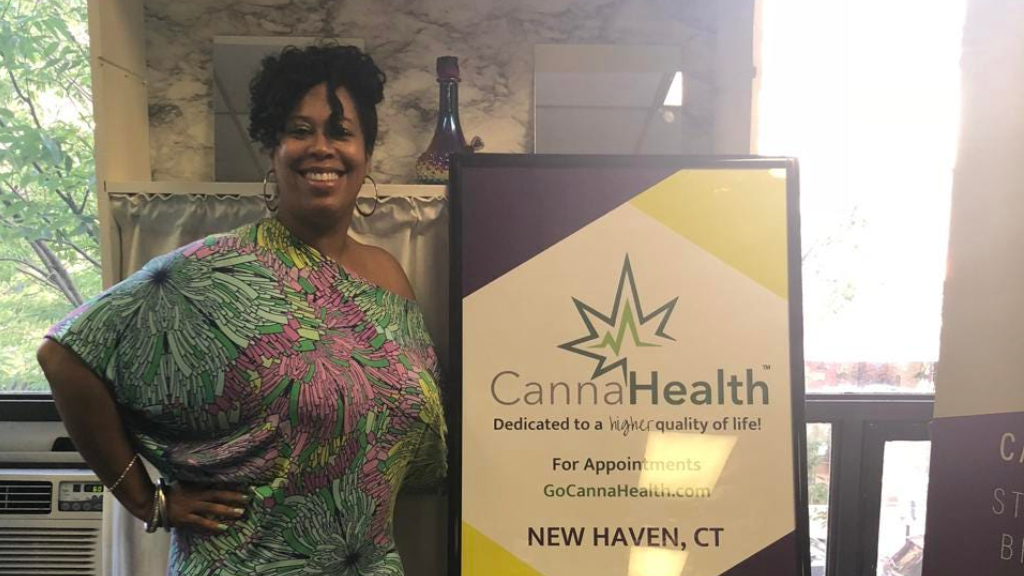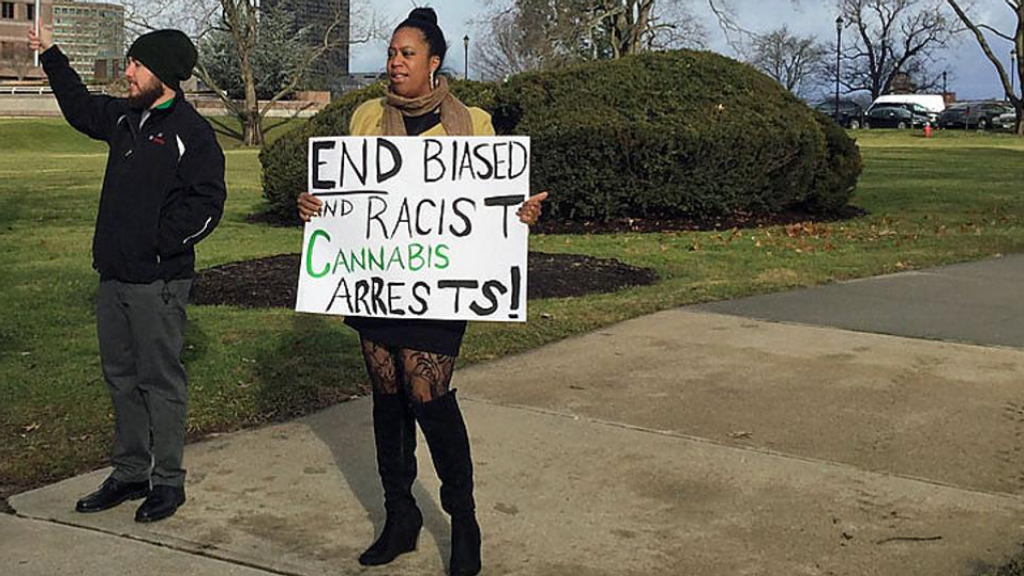
*NEW HAVEN, Conn. — Focusing on social equity, a black woman whose business certifies residents for Connecticut’s medical marijuana card is taking advantage of measures in a new state law that target the issue most important to her.
Kebra Smith-Bolden, a former nurse and founder of CannaHealth, aims to provide security for people in her community who consume or medicate with cannabis.
A groundbreaking part of the new law, which went into effect July 1, is social equity.
It requires half of all licenses for entry into the state’s marijuana business be reserved for social-equity applicants, those from areas disproportionately affected by the war on drugs, according to the U.S. Census.
For Smith-Bolden, the new law means “righting the wrongs.”
The law will expunge the criminal records of people with certain cannabis crimes within a specific time period. When Gov. Ned Lamont signed Senate Bill 1201 into law on June 22, he stated: “We are helping our state move beyond this terrible period of incarceration and injustice.”
“That, to me, is a positive thing,” Smith-Bolden said, “but what I don’t like is that, if you’re expunging records because you’re acknowledging that those charges were racially motivated — and should be rescinded so that the legislation protects the communities it once criminalized — then why would you not allow for people with criminal histories to engage in the industry?”
State Rep. Steven Stafstrom (D-Bridgeport) said, “The definition of social equity applicant is fairly broad and certainly could include someone who was formerly incarcerated, and I think the definition we have is sufficient.”
Another issue the law addresses the costs associated with dispensaries. Social equity applicants will pay 50 percent of the price other applicants pay. The state’s posted list of prices shows that a retailer in the adult-use cannabis program must pay $25,000 for a license. The social equity fee for the same is $12,500.
A Social Equity Council of 15 people will develop a cannabis business accelerator program to provide technical assistance to those starting out, as well as a workforce training program for social-equity applicants.
Revenue from the expanded industry will help the state offset some of the costs. Connecticut’s Office of Fiscal Analysis estimates the state will see $75 million from the regulation and taxation of recreational marijuana in the next five years. By mid-2023, it is projected that the state will begin to distribute money to specific funds for equity initiatives and substance abuse prevention.
MORE NEWS ON EURWEB: ‘The Wire’: Male Actor Alleges Sex Abuse – Female Journalist Said it was Consensual | VIDEO

Mixed response
Despite these positive projections, Smith-Bolden has mixed feelings about the new law, which creates a market for recreational marijuana.
Under the law, for adults ages 21 and over, possession of up to 1.5 ounces of cannabis on their person and up to 5 ounces in their homes or locked in their car, truck or glove box is legal. Smith-Bolden wonders how this will affect her business.
Legalization across the board will lead to the volume of cannabis customers being spread out in different markets. At the same time, there will still be a viable market for people wanting medical prescriptions for justification for its use, she said.
Coming from a community where legislation like this will have a profound impact on her business, Smith-Bolden has concerns. Before this legislation, the only way to securely consume cannabis in Connecticut was by obtaining it with a medical card.
Under the new law, medical marijuana dispensaries can convert to also serve adult-use, but there is a high cost. They must “pay a fee of $1 million, which can be reduced to $500,000 if they create at least one ‘equity joint venture,’” the law states. “’Equity joint ventures must be at least 50 percent owned by a social equity applicant.”
Broader access
Smith-Bolden views social equity as a multi-tiered responsibility, including ownership in the cannabis industry. Legalization offers a path for more people to have access to the healing aspects and other uses of the plant, along with a business opportunity.
“In other states, equity in cannabis has been an afterthought, and I think Connecticut was able to capitalize on states like Massachusetts and Illinois to take the positive from those bills but learn lessons from the areas that did not work,” she said.
The law states that users can now buy medical marijuana from any dispensary, even those that have adult-use licenses, rather than exclusively the one to which they are assigned.
“The ability to choose where you can obtain your medicine is vital to ensure we are respecting a patient’s rights. Patients should be able to choose where they would like to spend their money and should not have to stay bound to a provider they no longer want to patronize, due to the bureaucracy of paperwork,” Smith-Bolden said.
She wants people who live and work across the state to access their medicine with the same ease as acquiring prescription pharmaceutical drugs.
Smith-Bolden said CannaHealth’s goal is to implement health care, education, advocacy and protection for her community. People who live in public housing or are on probation or parole, or involved with the Department of Children and Families can be evicted or have their children taken because they consume cannabis.
In Connecticut in 2011, black people were four times more likely to be arrested for marijuana possession than white people, according to the American Civil Liberties Union (ACLU).
One section of the legislation requires more participation and access to advanced roadside impaired driving enforcement for police officers, a concern for the ACLU.
“We want to be sure the language in the legislation calling for new police officer standards and increased access to drug recognition training is not abused to continue to over-police black, Latinx, and low-income communities,” it said in an open letter to the state.

Getting into the business
When Smith-Bolden attended the Northeastern Institute of Cannabis in Massachusetts after 20 years of being a registered nurse, she learned more about how cannabis prohibition led to such over-policing in her community.
“That put together the reality of the war on drugs being a war on my community and how that affected my community. I immediately started thinking about ways to enter the cannabis industry and use it as a form of reparation for me as well as a way to provide access to safe plant-based medicine for people in my community who hadn’t been looking at cannabis like that,” she said.
Her grandmother, who suffered an aneurysm, was the one who inspired her to start researching the plant. After medicating with cannabis, she saw a remarkable turnaround in her overall health, mood and ability to move.

One of Smith-Bolden’s first clients was a 94-year-old woman with a broken hip who was terrified of taking opioids.
“I was able to medicate her and keep her safe from an opioid overdose and addiction …,” Smith-Bolden said.
One of the most prevalent diagnoses that Smith-Bolden sees is patients with post traumatic stress disorder (PTSD).
“I get people who are post imprisonment, have PTSD, and need to medicate, but because of their post-prison statuses like probation or parole or any type of monitoring service, they need CannaHealth to be able to medicate with the plant without being arrested… which is ridiculous,” she said.
But with the proper enforcement of this new law, she said, this will no longer be an issue.
Edited by Judith Isacoff and Fern Siegel
The post Medical Marijuana Entrepreneur Sees Racial Reckoning In Connecticut’s Legalization Of Cannabis appeared first on Zenger News.

